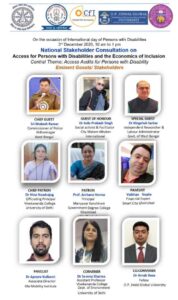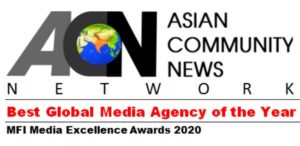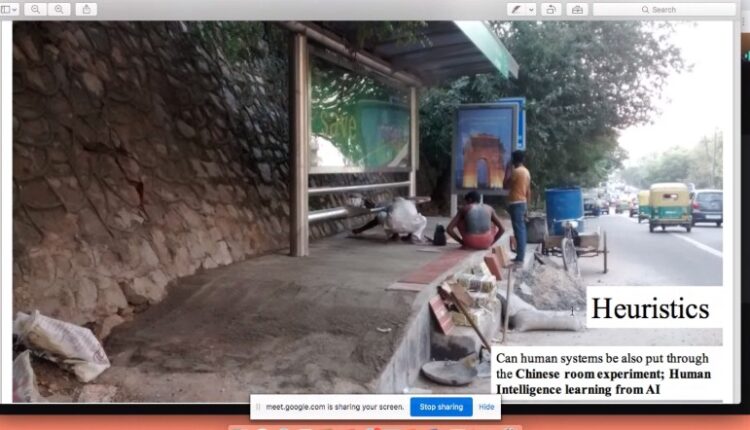NEW DELHI: A stakeholder consultation on “Access for Persons with Disabilities and the Economics of Inclusion” was conducted on 3rd December 2020, the International Day of Persons with Disabilities.
The virtual event was hosted by Vivekananda College in collaboration with Manyavar Kansiram college, Ghaziabad, Uttar Pradesh, Center for Inclusion, and O. P. Jindal Global University.
While convening the event, Dr. Seema Sharma, Vivekananda College, and Dr. Arnab Bose, O. P. Jindal Global University brought together important stakeholders from four different states of India for the social cause. The patrons for this event were Dr. Hina Nandrajog, Officiating Principal, Vivekananda College, University of Delhi, and Prof. Archana Verma, Principal, Manyavar Kansiram Degree College, Ghaziabad.
Asian Community News (ACN) Network was the Media Partner of the event.
The overall objective of this event was to put forward an Economic Incentive centric model over Charity or even a Rights-based model for the inclusion of Persons with Disabilities. The proposed idea of economic incentive-driven inclusion was presented by Dr. Arnab Bose and Dr. Seema Sharma in the form of a research presentation and access audit framework to the stakeholders during the consultation.
The Chief Guest for the event was Sri Mukesh, Commissioner of Police, Bidhannagar, West Bengal.
The eminent discussants as Guests of Honour for this event were Dr. Indu Prakash, Social activist & facilitator CityMakers Mission International, and Dr. Kingshuk Sarkar, Independent Researcher, and Labour Administrator, Govt. of West Bengal. Among other important discussants were Apoorv Kulkarni, Associate Director, Ola Mobility Institute, and CA Vaibhav Gupta, Financial Expert, Smart City, Ghaziabad along with other discussants from academia.
 On this occasion, Dr. Hina Nandrajog shared a very strong message that Persons with Disabilities (PWD) should not be taken as a burden of this society rather they should be taken as an asset of this society. Similarly, Prof. Archana Verma also shared that the determination and strong will of PWD have should be an inspiration to all in society.
On this occasion, Dr. Hina Nandrajog shared a very strong message that Persons with Disabilities (PWD) should not be taken as a burden of this society rather they should be taken as an asset of this society. Similarly, Prof. Archana Verma also shared that the determination and strong will of PWD have should be an inspiration to all in society.
During the consultation, the idea of economic incentive-driven inclusion and proposed access audit module was well taken and got appreciation from across stakeholders. The whole discussion revolved around making access audit affordable and using emic narrative for doing audits rather than etic which is the present scenario.
As per the module authors (Dr. Arnab Bose and Dr. Seema Sharma), Emic narratives include the user experiences of, first, residents and locals of a particular area, and second, of Persons with Disabilities. Etic narratives are usually of technical experts, like town planners or architects, whose feedback is important but might miss pertinent nuances. Both emic and etic narratives are important, however creating an audit mechanism with an ongoing emic narrative will be important, and will definitely reduce the cost of compliance and make the audit process more effective and efficient.
During the access audit module discussion, Dr. Indu Prakash Singh suggested that city scores or indices to judge the accessibility of the cities for the persons with disability can be envisaged. On affordability of access audits, he also highlighted the need for change in the mindset and preparedness of government and various agencies to include access audits as a part of the plan so that they need not go for extra budget.
Dr. Kingshuk Sarkar in his discussion points spoke about the importance of the bottom-up approach and decentralized approach for economic-based inclusion for persons with disabilities. Aproov Kulkarni of Ola Mobility, strongly supported the emic narrative-based access audit module being a person with a disability and asked to look into the various nuances that are associated with Persons with Disabilities.
In addition, to make access audits affordable the need for mass capacity building programs and need of government schemes in this regard was highlighted by Dr. Seema Sharma and was well supported by all eminent discussants. The event ended on the note of initiating projects in partnership with all eminent discussants and partners to bridge the gap and make the urban spaces more inclusive and better place to live.
During the event police, public partnership project was announced by the Centre for Inclusion with Bidhannagar Police Station, West Bengal.



